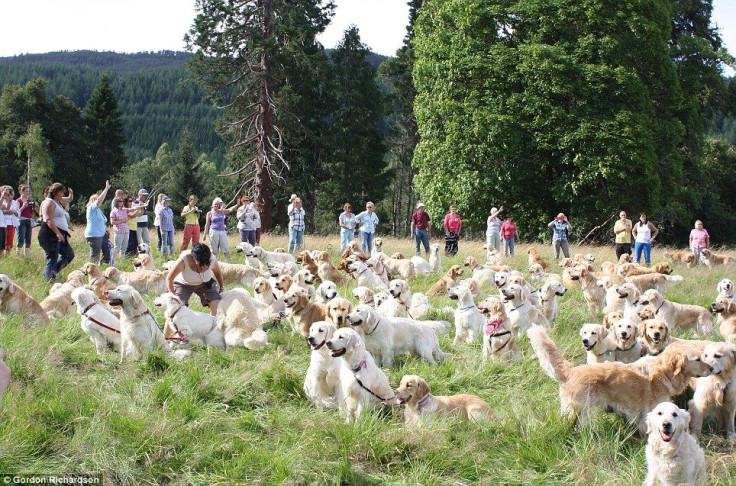222 Golden Retrievers Bring Joy To Breed’s Birthplace In Scotland: How The Family-Friendly Pet Also Relieves PTSD Sufferers

A record-breaking number of golden retrievers came from all around the world to descend upon the Guisachan Gathering last month, a yearly festival to celebrate the breed in its historic Scottish birthplace. While the event unquestionably brought joy to the hundreds of attendees, an even greater number of veterans and other sufferers of posttraumatic stress disorder (PTSD) have found lasting relief from golden retrievers’ unconditional affection and security.
The total count reached 222 goldens at the festival, which is a record for the event now in its third year. It began in looser forms in 2006 when the Golden Retriever Club of Scotland (GRCS) decided to celebrate Lord Tweedmouth’s contribution in the 19th century when he introduced the breed. Now, dogs and handlers from around the world come to let their pups prance in the Highland grass.
Jim Richardson, GRCS committee member, organized the event and said negotiating hundreds of dogs and handlers proved somewhat hectic.
“The last three months of planning were a bit manic, but it was all worthwhile. I had a PA system and I was shouting at the owners ‘Get out! Get out of the photo!’” he told the Daily Mail. “There were people from all over the place, where you really wouldn’t expect, like Hawaii. And it was a free-for-all afterwards.”
One of the obvious problems was avoided, however.
“Of course, everybody knows their own dog though,” he added, “and your eyes are glued to it the whole time.”
Retrievers Offering Relief
Part of what makes golden retrievers such popular pets is that they help PTSD sufferers and wounded veterans re-enter civilian life.
Mentally, people with PTSD often find themselves perpetually anxious — always in a heightened state of awareness and feeling hypervigilant. Such effects aren’t uncommon, as the daily demands of military life prepare one’s psyche for imminent threats at all times. Dealing with these symptoms requires a sense of security — a reassurance that the threats aren’t real.
Golden retrievers have been employed for their alertness in exactly these matters, as they were originally bred for their hunting and tracking skills. The breed stands out, however, as being dually protective and affectionate. They have a keen sense for human emotion and rarely become aggressive. In a testament to their loving nature, golden retrievers can hold an egg between their teeth without breaking it, due to their characteristic “soft mouths,” a term used by breeders to refer to a dog’s tendency to cradle, not chomp, objects that they carry.
As treatment extends for many vets, the benefits stretch from the short-term to the long-term. What began as a sleep aid or car key fetcher, the golden retriever’s role then evolves to helping its owners relearn communication and social skills. The simple act of taking the dog for a walk opens up handfuls of conversations that, otherwise, never would’ve taken place.
“Now I’m being forced to conversate. I’m being forced to interact. I’m being forced to deal with other people’s emotions,” Chris Hill, who served 20 years in the marines and four combat deployments as gunnery sergeant, told Smithsonian of his service dog, Verde. “I’m being forced to deal with my own.”



























